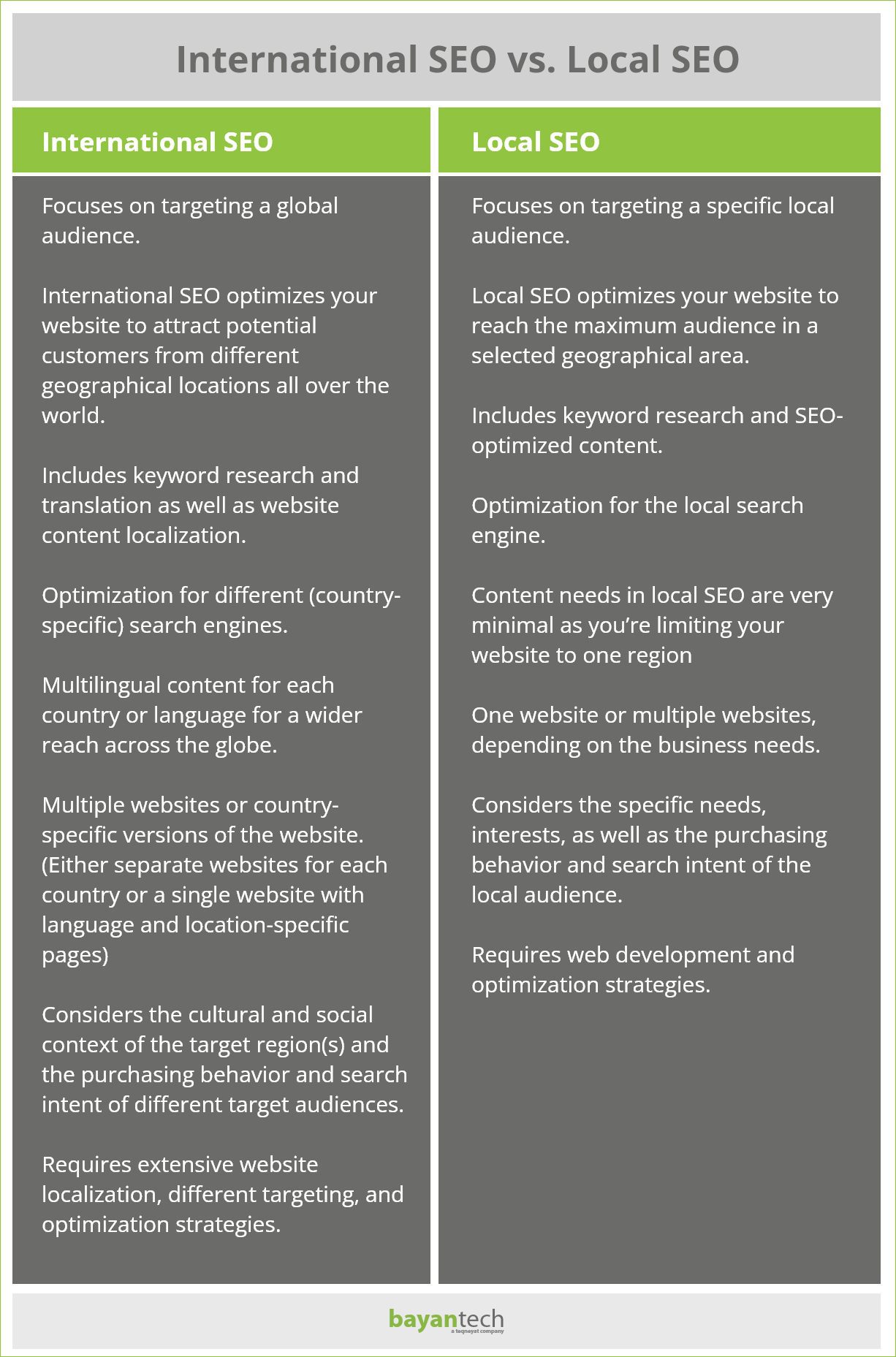From Localization to Globalization: International SEO Essentials
From Localization to Globalization: International SEO Essentials
Blog Article
Browsing the Digital Landscape: Leveraging International Search Engine Optimization for Cross-Border Success
In today's interconnected digital globe, businesses are significantly looking past boundaries to touch into international markets. The intricacy of navigating the digital landscape on a worldwide scale demands a nuanced method, from recognizing the principles of International Search engine optimization to implementing geotargeting and multilingual keyword phrase methods.
Recognizing International Search Engine Optimization Fundamentals
Navigating the details of international SEO needs a solid grasp of fundamental principles to successfully increase on the internet exposure throughout boundaries. One crucial facet of international SEO is recognizing the significance of localization. This entails tailoring website material to suit the etymological, cultural, and business distinctions of target markets. Keyword phrases have to be not just converted but also adapted to mirror how users in different areas search for information.
In addition, having a clear understanding of geo-targeting is important. This includes showing to search engines the particular nations or regions an internet site is targeting. Implementing hreflang tags is one means to interact this info, making sure that the correct variation of a website shows up in the search engine result for a customer in a particular place.
Moreover, comprehending the effect of regional search engines and social networks platforms is essential for global search engine optimization success. As an example, while Google is leading in many areas, nations like China have their own online search engine like Baidu, needing tailored strategies for each and every system to maximize on-line exposure.

Targeting Multilingual Key Phrase Techniques
Developing multilingual keyword phrase methods is necessary for properly getting to varied worldwide audiences and optimizing on-line visibility across different linguistic areas. When targeting multilingual search phrase techniques, it is vital to perform comprehensive research study to understand the details search terms and expressions utilized by the target market in each linguistic region. This involves not only converting key words yet also considering social subtleties, regional languages, and search fads one-of-a-kind to each target audience.
To produce an effective multilingual key phrase technique, it is necessary to focus on significance and search intent. Key phrases need to straighten with the material on the website and reverberate with the cultural context of the target market. Making use of devices such as Google Key Words Planner, SEMrush, or Ahrefs can assist identify high-performing keyword phrases in various languages and assess their search quantity and competition level.
In addition, tracking and assessing the efficiency of multilingual key words regularly is essential for maximizing and fine-tuning the strategy with time. By continually adapting to changes in search habits and fads, services can boost their on-line presence and draw in more global web traffic to their web sites.
Applying Geotargeting and Hreflang Tags
When aiming to enhance global search engine optimization techniques, including geotargeting and hreflang tags read more is essential for enhancing website presence across various regions. Geotargeting entails customizing web content to details places, guaranteeing that users in various areas obtain appropriate details. By carrying out geotargeting, organizations can boost their local search rankings and bring in region-specific web traffic.

Optimizing Site Structure for International Exposure
To further boost global SEO strategies past geotargeting and hreflang tags, optimizing the website structure is imperative for attaining worldwide exposure and optimizing reach throughout different areas. A well-structured website not only boosts customer experience however also helps with search engine crawlers in comprehending the material and context of the site.
Additionally, creating language-specific subdirectories or subdomains can aid internet search engine supply the ideal version of the web site to users based upon their language preferences, better boosting the total individual experience. Additionally, optimizing URL structures to include relevant keyword phrases and geotargeted terms can enhance the website's exposure in various regions. By structuring the website efficiently for global audiences, companies can raise their opportunities of attracting international traffic and increasing their reach across borders.

Tracking and Evaluating Cross-Border Performance
Reliable tracking and studying of cross-border performance is essential for reviewing the success of international search engine optimization techniques and identifying possibilities for renovation in worldwide reach and exposure. By closely tracking key efficiency signs (KPIs) throughout various markets, businesses can gain valuable insights into the effectiveness of their view publisher site cross-border SEO initiatives. Monitoring metrics such as organic web traffic, keyword rankings, conversion prices, and bounce rates can offer a thorough sight of just how well an internet site is executing in various areas.
Evaluating cross-border efficiency data permits organizations to determine trends, patterns, and locations for optimization. By blog contrasting efficiency throughout different nations, areas, or languages, firms can pinpoint effective approaches and center web content to better provide to specific target market. Additionally, keeping track of cross-border efficiency makes it possible for organizations to stay agile and responsive in the ever-evolving digital landscape. Regular analysis of SEO performance on a worldwide scale ensures that companies can adjust their approaches promptly to profit from arising chances and keep a competitive edge in global markets.
Verdict
In verdict, worldwide search engine optimization plays a critical function in accomplishing cross-border success by maximizing web sites for global visibility, targeting multilingual keyword phrase approaches, carrying out geotargeting and hreflang tags, and monitoring cross-border efficiency. By recognizing the basics of international search engine optimization and maximizing website frameworks accordingly, businesses can efficiently reach and engage with their target market throughout different regions and languages. This calculated method is important for increasing market reach and driving online development in today's digital landscape.
Report this page